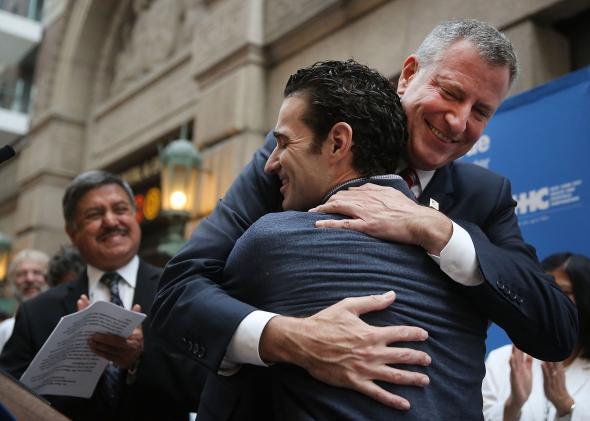The last American Ebola patient, Craig Spencer, has been given a clean bill of health and discharged from New York’s Bellevue Hospital. A number of people are still being monitored because of possible exposure to the disease, but assuming that no new cases are reported by early December—42 days after Spencer was diagnosed—the U.S. will join Nigeria and Senegal as countries that have beaten the disease this year. Spencer’s recovery also means that of the nine people treated in the United States for the disease, which has a 70 percent mortality rate in West Africa, only one has died.
There’s also good news from Mali, which saw its first Ebola case—a 2-year-old girl who arrived from Guinea and died shortly after—in late October. The New York Times reports that a “21-day quarantine since the little girl’s death on Oct. 24 is almost over, and 41 of the 108 Malians in quarantine are due to be released Tuesday, and the remainder by Friday.” It’s looking increasingly like the Malian outbreak will be limited to one.
Malian authorities deserve credit for a quick response to prevent a catastrophic outbreak, but as the Times notes, the case also “illustrates how even people in close contact with victims do not necessarily get the disease, which spreads when infectious fluids get into an open cut, or a nose, eye, or mouth.” None of the people who touched the girl, including the three family members who traveled with her from Guinea and the dozens of doctors, nurses, and traditional healers who treated her, appear to have been affected.
A number of Nigerian readers were offended by a post I wrote a few weeks ago that suggested that the country’s success in containing its outbreak tells us more about the characteristics of Ebola itself than the effectiveness of the Nigerian government’s response. My intention was certainly not to pick on Nigeria in particular. And certainly, politicians in my own country haven’t distinguished themselves in responding to the disease.
But the experiences of Nigeria, Senegal, Mali, and the United States—the countries outside the “hot zone” to which the disease has spread—do suggest that the conventional wisdom about Ebola before this very unusual outbreak was correct. While dangerous, the disease is difficult to spread, and with quick action to isolate patients and quarantine potential exposures, it should be possible to contain pretty quickly. This is true not only in wealthy countries like the United States but in poor and relatively unstable ones like Mali and the Democratic Republic of Congo, which has mostly managed to contain a separate outbreak that killed about 40 people this year—a story barely noticed by the international media.
All of this should raise tough questions for the governments of Guinea, Liberia, and Sierra Leone—the countries where the virus is still raging—as well as international health organizations, about how things got so out of hand when this outbreak might still have been containable. The fact that Sierra Leone this week arrested a journalist who had criticized its response to the disease doesn’t suggest this is a conversation they’re looking forward to having.
